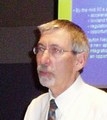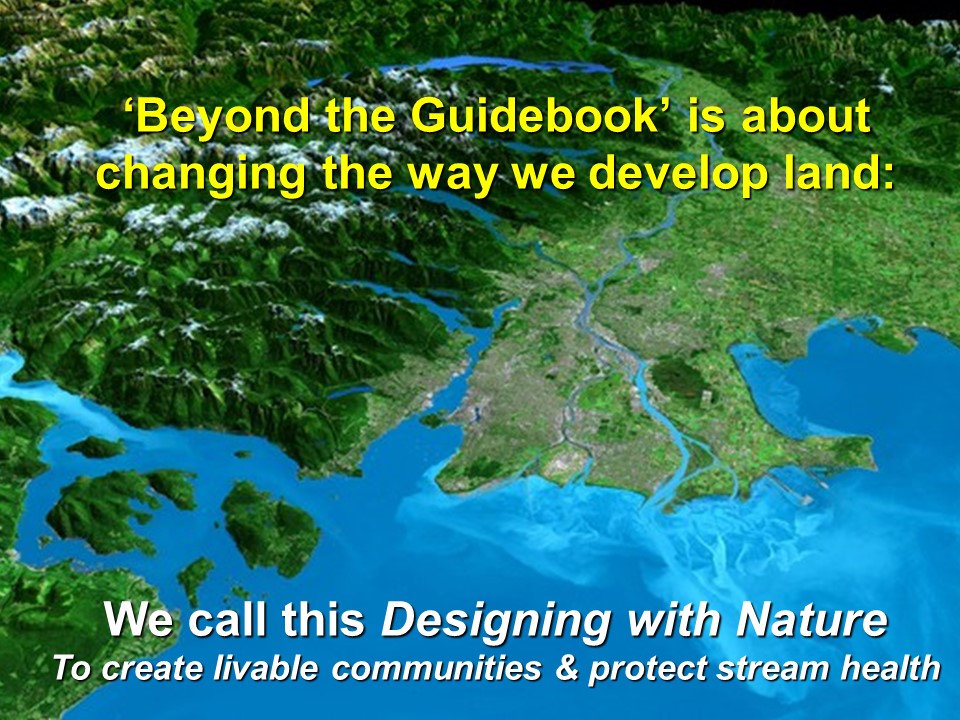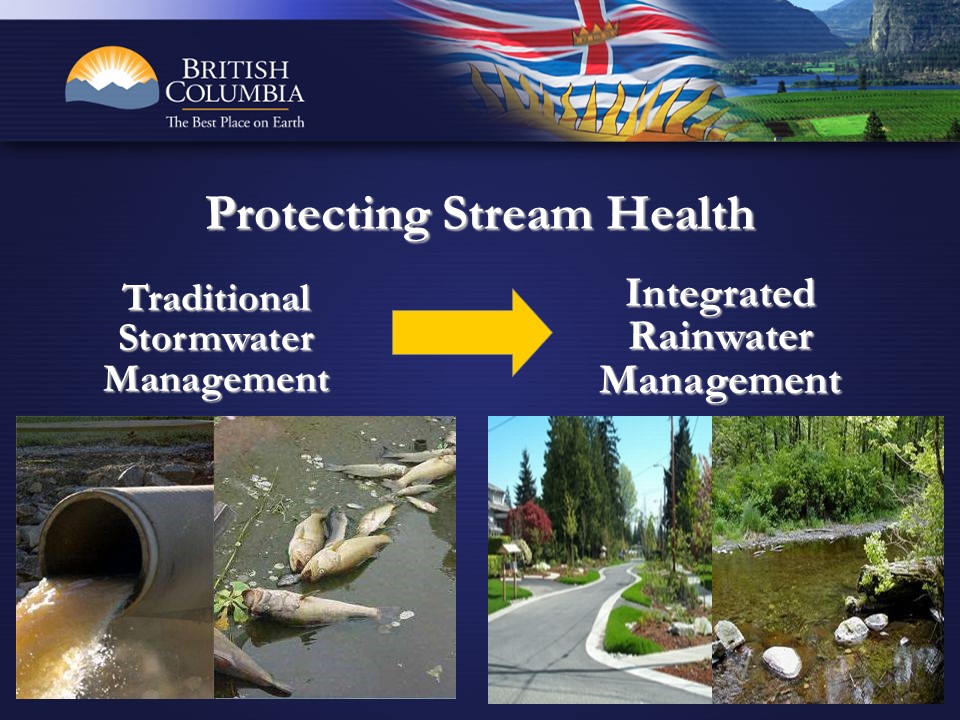SUSTAINABLE WATERSHED SYSTEMS, THROUGH ASSET MANAGEMENT: A decade long journey has its beginning in the seminar that launched the Beyond the Guidebook Initiative (November 2007)
Note to Reader:
It has been a building blocks process to arrive at the way of thinking and doing that the Partnership for Water Sustainability has branded as Sustainable Watershed Systems, through Asset Management.
A defining moment in the building blocks process was the 2007 Beyond the Guidebook Seminar. At this event, undertaken in collaboration with the Association of Professional Engineers and Geoscientists (APEGBC), the spotlight was on how to implement ‘green solutions’ that actually protect stream health.
It provided a forum to mark the formal launch of the Beyond the Guidebook Initiative. This was a milestone event.
Guidebook Premise:
Land Development and Watershed Protection can be Compatible
 “Beyond the Guidebook builds on the foundation provided by Stormwater Planning: A Guidebook for British Columbia. Released in 2002, its underlying premise that land development and watershed protection can be compatible represented a radical shift in thinking,” stated Kim Stephens in 2007.
“Beyond the Guidebook builds on the foundation provided by Stormwater Planning: A Guidebook for British Columbia. Released in 2002, its underlying premise that land development and watershed protection can be compatible represented a radical shift in thinking,” stated Kim Stephens in 2007.
“The Guidebook recognized that water volume is something over which local government has control through its infrastructure policies, practices and standards.”
At the time, Kim Stephens was Program Coordinator for the Water Sustainability Action Plan for BC. Today, he is Executive Director, Partnership for Water Sustainability in BC.
To Learn More:
Visit the Rainwater Management community-of-interest:
https://waterbucket.ca/rm/category/british_columbia_guidance_documents_context/beyond_the_guidebook_context/
Minister’s Perspective on a
Natural Systems Approach
“The Stormwater Planning Guidebook set in motion a chain of outcomes that has resulted in British Columbia being recognized internationally as a leader in implementing a natural systems approach to rainwater management in the urban environment,” stated  (former) Minister of Environment Barry Penner in 2007 at a cross-border conference held in Seattle in October, the month before the Beyond the Guidebook Seminar.
(former) Minister of Environment Barry Penner in 2007 at a cross-border conference held in Seattle in October, the month before the Beyond the Guidebook Seminar.
“The Convening for Action initiative creates an opportunity to move beyond rainwater management to embrace all components of the water cycle through integrated water management. It will turn ideas into action.”
“I am pleased with the continuing success of the ministry’s partnership with the BCWWA’s Water Sustainability Committee in providing program delivery for the Water Sustainability Action Plan. I value the important role this partnership is playing in promoting awareness and supporting communities to integrate water management practices with local land use planning and development programs. The ministry continues to provide core funding to support implementation of this Action Plan.”
In 2010, the Water Sustainability Committee morphed into the Partnership for Water Sustainability in BC, a independent entity and not-for-profit society.
To Learn More:
The Goal:
Move from Awareness to Action
Under the umbrella of the Water Sustainability Action Plan for British Columbia, the Green Infrastructure Partnership rolled out Beyond the Guidebook at a Vancouver seminar in November 2007. The seminar was structured in three parts to deal with the Why, What and How in going Beyond the Guidebook.
Implement a Runoff-Based Approach
Released in June 2007, “Beyond the Guidebook” refers to a runoff-based approach to drainage modeling that connects the dots between source control evaluation and stream health assessment.
The seminar also enabled the Green Infrastructure Partnership to report out on provincially funded programs and tools that are being developed and implemented through partnerships.
 “The Beyond the Guidebook Seminar was held a month after the last event in the 2007 Showcasing Green Infrastructure Innovation Series. The series goal was to share green infrastructure approaches, tools, experiences and lessons learned as an outcome of designing with nature. As a logical next step, the seminar created a learning opportunity to help practitioners move from awareness to action,” stated Paul Ham, Chair of the Green Infrastructure Partnership, in 2007.
“The Beyond the Guidebook Seminar was held a month after the last event in the 2007 Showcasing Green Infrastructure Innovation Series. The series goal was to share green infrastructure approaches, tools, experiences and lessons learned as an outcome of designing with nature. As a logical next step, the seminar created a learning opportunity to help practitioners move from awareness to action,” stated Paul Ham, Chair of the Green Infrastructure Partnership, in 2007.
To Learn More:
To read the complete story about the event, click on Beyond the Guidebook Seminar.
To download a copy of the agenda, click on Seminar Program; and to download a copy of the program objectives, click on Seminar Learning Outcomes.
Province-wide Audience
“The response by the engineering community and others was overwhelming, and came as a welcome surprise,” reported Paul Ham.
Attendance was capped at 72 and there was a waiting list. “We were at capacity two weeks before the event. If we had the option to switch to a larger venue, we would have filled it,” added Kim Stephens.
“We squeezed as many people as we could into the room. Clearly, there is a strong practitioner interest in learning more about rainwater management and green infrastructure, and understanding the emerging regulatory framework.”
Although the majority of attendees came from Metro Vancouver and the Fraser Valley, the seminar attracted a province-wide audience. There was a large contingent from Vancouver Island. Attendees also came from as far away as Prince George and the Okanagan.
A Transformational Event?
Kim Stephens provided this perspective on what he believes was accomplished by the seminar:
“We started the day with high expectations that the Beyond the Guidebook Seminar would prove to be a transformational event, and we exceeded those expectations as the day unfolded.
“Further, my prediction is that this event will become part of our green infrastructure folklore, much as the 2005 REAC Consultation Workshop and the 1997 Union of BC Municipalities focus group workshop were defining moments in moving British Columbia down a pathway that led to the Beyond the Guidebook Seminar.
“It is the telling of the story about an event that takes on importance in moving practitioners from talk to action.
“A key is that those who were there come away inspired and start doing things differently in their day jobs as a result of what they learned by being part of the moment.”
To Learn More:
To download a PDF copy of the Agenda, click on the image below.







